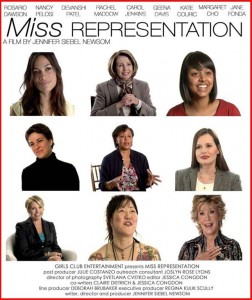Miss Representation Could Raise Awareness of Media’s Negative Images of Women
The media — television shows , movies and the news industry — send powerful, subliminal messages to the public.
Jennifer Siebel Newsom, writer, director and producer of the documentary “Miss Representation,” said these messages can be damaging when it comes to women. Women are often portrayed in the media as sex objects valued more for their breast size than brains, she says.
“I wanted to better understand where this under-representation was coming from and started looking at how the media portrayed women and how the portrayal of women impacted young people, in particular both young girls and young boys who grow up thinking that a woman’s value lies in her youth and beauty and her sexuality and not in other assets,” Siebel Newsom said.
“Miss Representation” will air Oct. 20 at 9 p.m. Eastern (8 p.m. Central) on the Oprah Winfrey Network.
Social workers often help children, teenagers and adult clients deal with a variety of issues that “Miss Representation” addresses, including eating disorders, body image and self esteem. So OWN asked social workers to review an advance copy of “Miss Representation.”
Our review team includes Dr. Maria Baratta, MSW, LCSW, ACSW, PhD, author of “Skinny Revisited: Rethinking Anorexia Nervosa and its Treatment” ($26.99, NASW Press); Susan Birne-Stone, PhD, of Brooklyn; Jill Carpenter Smith, ACSW, ASW-G, of New Jersey; Tianca Crocker, MSW, project manager at the Center on Budget and Policy Priorities in Washington, D.C.; and Mary Rzeszut, LMSW, a social worker at Winthrop University Hospital in Mineola, N.Y.
Here is their conversation:
Q: On a scale of one to five stars, what would you give Miss Representation?
Baratta: I watched the movie and loved it. I’d give it five, actually six stars!
Carpenter Smith: Five stars.
Birne-Stone: Five stars.
Rezeszut: I would give “Miss Representation: four stars.
Crocker: Overall, I rate “Miss Representation” as a three-star documentary in terms of content, clarity of message and appeal to broad audiences. The documentary takes a bold approach at addressing the pervasive nature of media messages on women’s subconscious perceptions of themselves and the world around them. The film’s characterization of the “impossible standard” is an eye-opening experience that will leave many viewers wondering if their thoughts and actions are truly their own, or simply a repackaged expression of persistently repeated messages on television.
Q: Would you recommend this film to other social workers and the general public and if so why?
Carpenter Smith: Absolutely. I think that over the course of time we have begun to just accept the advertisements and words and the messages about women. This film was a powerful wake-up call for us all to pay better attention.
Rzeszut: I would recommend this movie to social workers who address issues facing young girls. I don’t know if I would recommend it to the general public. Unfortunately, I do not think it would hold the interest of the general public. I think it would be of most interest to mothers of young girls.
Baratta: I would recommend it highly to social workers and everyone. You would be surprised at how little awareness there is about how powerful the media is manipulating the role of women in our society.
Birne-Stone: I would recommend this film to social workers, as well as to other mental health and media professionals and especially to educators of all levels. The issue of how girls and women are presented in the media impact not only women but men. This documentary clearly illustrates this. It raises awareness of themes that are so critical, current and important. With regards to the general public, although I think the message is vital for all audiences, I think some may be more open to viewing than others. It is a documentary and some people are not open to watching this type of film. The film’s length (1 hour 29 minutes) may be a deterrent. I would recommend an abbreviated, edited version be used to educate and raise awareness of this issue.
Crocker: I would recommend this film to anyone interested in learning more about how the media affects our lives, with a caveat that this piece should serve as a biased perspective that raises a lot of good questions for further exploration. For social workers, I recommend they use the film in educational settings as a discussion piece among future social workers and in practice to complement any cognitive behavioral work with clients struggling with identity and poor self-esteem.
Q: How does this film reflect what you see and experience in social work practice?
Carpenter Smith: I think the film was pretty accurate. Unless one engages a woman in a conversation about the media view, a lot goes unspoken. I wonder how really aware everyone is of what is going on and the messages being sent.
Rzeszut: In my social work practice I have facilitated programs for girls and self esteem. The topics discussed with the girls are about the media and body image. I have heard the tremendous pressure these young girls feel in regards to their weight and physical appearance. The program is designed to have the girls look beyond their bodies.
Baratta: I work with really smart, successful women as patients who are remarkably unaware of how heavily affected they are by media messaging. One of my strategies in treating eating disorders, depression and anxiety in women is to interject awareness of how women are bombarded by messages about body image, sexism, women as objects, women’s second-class citizenship in our society; how there is always something about women that needs improving. This movie gives voice to the elephant in the room.
Birne-Stone: As a clinical social worker in full-time private practice, I see these issues manifest in girls and adult women in the unrealistic expectations they place on themselves and their daughters. It always amazes me that no matter how accomplished or successful my clients are, too many struggle with how they look to the degree that it affects every aspect of how they feel about themselves. I also see many girls and women stuck in emotionally abusive relationships and one of the underlying issues is their sense of self. Even after the relationship ends they are still stuck trying to understand what was wrong with them, as opposed to seeing that it was the abusive male. I remember a social work colleague — a very accomplished, well-respected, highly published woman — tell me a story about how at an event where she was receiving an award, she did not want to get up to accept the award in fear that everyone would think she was fat. She was more focused on her appearance than on her accomplishments!
Crocker: As a social worker serving in a public policy setting, the film reflects our work to create messages about legislative proposals that resonate with broad audiences and clearly presents data to support that message. In terms of past direct service work, the film mirrors experiences working with young African American girls growing up in single parent households in low-income urban areas. The girls often unconsciously repeated the negative behavior of complex adult women they saw on television and presented with low perceptions of self-worth. It is important to note this behavior was merely a symptom of larger issues within the family, like neglectful parenting and extreme financial instability. As noted in the film, kids are exposed to negative images with no mediation, and the television in turn becomes another parent in the household.
Q: Do you think social workers are doing something to help offset some of the negative messages “Miss Representation” says the media is sending, especially to young people?
Rzeszut: Unfortunately, I do not see what is being done by other social workers to address the issues depicted in the film. If they are, it has not been highly publicized.
Carpenter Smith: Perhaps here and there. But again these messages can be very subtle (some are more obvious). I think that women may think they are not as worthy, smart, or capable but may not really realize why they think that way. If a social worker can realize how a woman has been affected, then, yes, social workers do address the issues depicted in the film.
Crocker: Yes! Everyday social workers strive to prevent or intervene at the micro and macro levels on issues like childhood bullying, depression, negative self-image, person-in-environment interventions, and negative intergenerational behaviors and belief. These are just a few of our skills areas.
Birne-Stone: I agree with Tiana Crocker. I do think that social workers are helping to address the issues depicted in the film. In many different settings and roles, social workers explore how girls and women view themselves and explore their values and roles. Social workers also do this work with boys and men about themselves and in relation to girls and women. Social workers help people question stereotypes about themselves as well as perceptions they have of others. Social workers focus on strengths and on empowering individuals. When we ask our clients, “And how did you learn that?” we are questioning the source for core beliefs, which are often untrue and destructive. When social workers talk with clients about the impact that media has had we are working toward raising their consciousness and lessening the impact of media.
Baratta: I have written and lectured to social workers on the very topic of women being faced with the pressure to adhere to impossible standards of beauty and how eating disorders have emerged historically when women have achieved strides in equality with men. There is always a sad consensus among my colleagues that this is in fact so. I believe that my contemporaries and colleagues are aware of the issues in the film since many were around when women had to struggle to achieve professional success and when it certainly was not a given that women could have careers. I believe that social workers serve as role models to the younger generations of women who present as patients. The implicit message is that women are smart, successful and can effect change. When I was in college in the midst of the feminist movement, women took part in consciousness raising group discussions about these very topics. It would be wonderful to see the re-emergence of that medium. This film is an excellent voice for a message that needs to be spread.
To learn more about the valuable services social workers provide women, young people and others visit the National Association of Social Workers’ “Help Starts Here” consumer Website by clicking here.
| Leave A Comment





I look forward to watching this show and I will share the information about this upcoming event with students in class so that they might also view it.
We do talk about such issues in two social work courses that I facilitate: “Human Behavior in the Social Environment” & “Human Diversity & Social Justice. These are both required courses in our BSW program. But I suspect you will find quite similar courses in any BSW program. I have previously broached some of these topics in class by showing these two videos.
slip of the tongue http://www.youtube.com/watch?v=Y1zpX4R33CA
and
Pretty by Katie Makkai http://www.youtube.com/watch?v=M6wJl37N9C0
Great content, like always! Really thankful that Social Work Speaks continues to raise awareness around cultural issues and provide links to media outlets for social workers! Awesome.
This sounds like an important show that should be recommended to other social workers. I also love the picture in this article with the guy in the suit standing over the babe in the bikini. That chick is smoking hot.